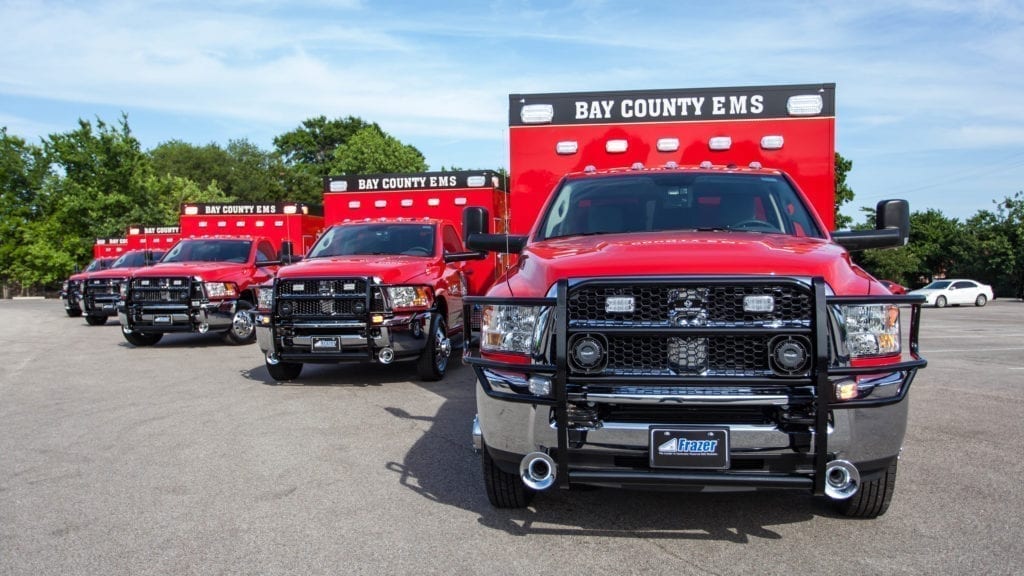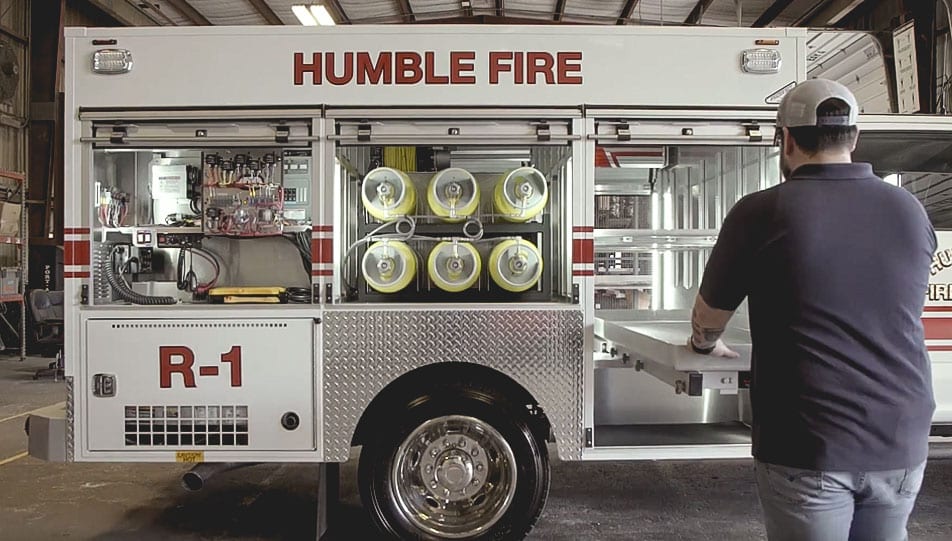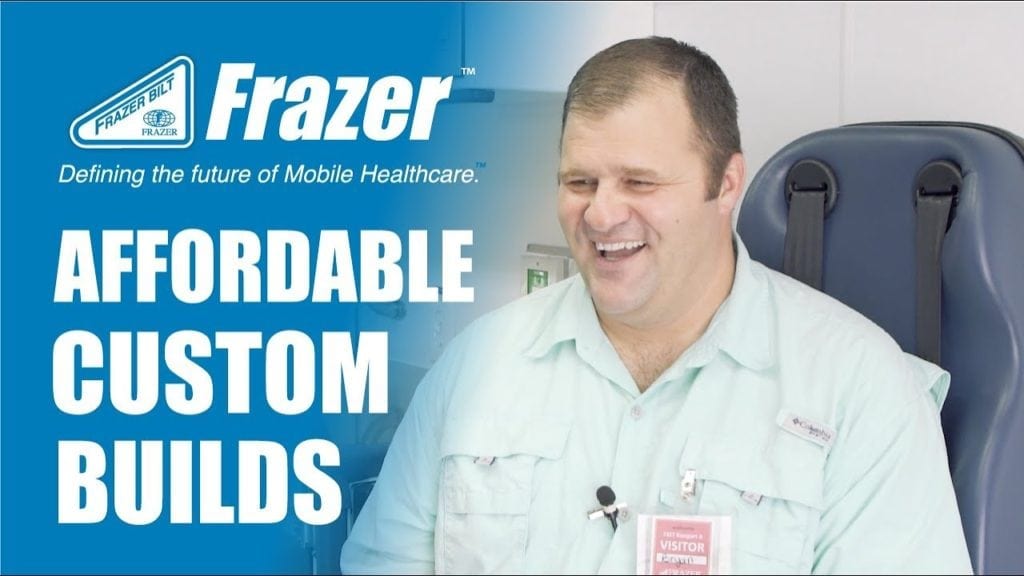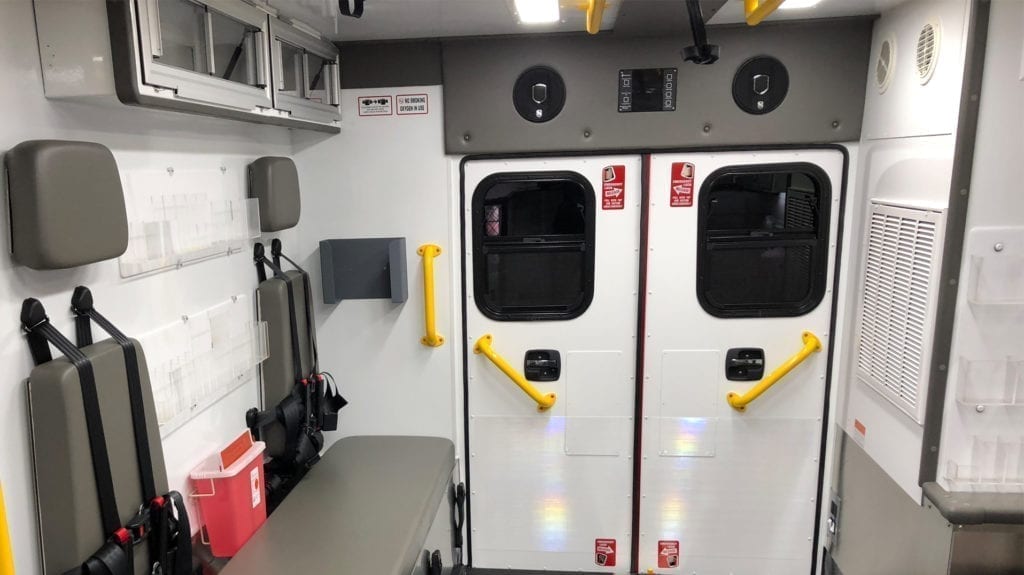Ambulance procurement can be challenging for even the most seasoned administrator. The following FAQs will help as you prepare for your next EMS vehicle. From financing to grants to cooperative purchasing requirements, Frazer has the answers you need.
Cooperative Purchasing or Competitive Bid?
Bid requirements vary greatly from state to state, and even among regional or local authorities.
In Texas, for example, most items over $50,000.00 must meet state bid requirements. In Louisiana, however, that figure drops $25,000.00, and in other states the rules may only apply to construction projects.
A quick web search for your home state’s municipal buying requirements should provide the relevant information.
Cooperative Purchasing
(Yes! We’re on HGAC and BuyBoard!)
Cooperative purchasing can be as simple as partnering with another municipality working on a competitive bid and buying your own vehicle with the same set of specs. Or, numerous government procurement services around the country allow for the same thing without the hassle or outcome uncertainty associated with the bid process.

These entities improve the process for end users by reducing the administrative and advertising fees for a competitive bid and by opening up the number of available products. They are designed to meet most state and local purchasing rules. A vast majority of our customers have found this a huge improvement to the normal ambulance procurement process.
Cooperative purchasing entities like Houston based, HGAC, evaluate products either through “competitive bid (IFB) or competitive proposal (RFP) process.” They offer the end user the pricing power of a national group of buyers as well as a thorough vetting of accepted vendors.
As with competitive bidding, rules will vary per location, but most states have some form of cooperative purchasing statute. Click here to see how your state handles cooperative buying.
Frazer is an authorized vendor through HGAC. We also work with BuyBoard, a purchasing cooperative run by the Texas School Board. Our EMS vehicles are available for purchase on both of these sites. Many of our customers have found cooperative buying a major improvement in the ambulance procurement process. It allows them to meet state requirements while ensuring they don’t end up with an unwanted vehicle. Call one of our sales team at 888-372-9371 to find out more.
The Bid Process
Here is a list of just some of the tasks you’ll confront when conducting a public competitive bid. Click here to see the current Texas statute defining purchasing requirements.
- Write your own vehicle specs
- Review specs with committee
- Advertise time and place of bid once a week for at least two weeks prior to award date
- Pre-bid conference
- Respond to any bid questions
- Evaluate bids
- Award bid
- Verify product received meets specs
The municipal bid process requires a significant amount of time and administrative effort. And while it can be very effective when vendors are offering apples to apples products, i.e. multiple Ford dealers bidding on an F-150 truck, things get a lot trickier as the specifications get more complicated.

Ambulance and fire apparatus are notoriously complex, and the differences in specifications, construction methods, and quality among builders are vast. Adding to the mix are purchasing agents or local attorneys who may not have experience with the product in question. Their involvement in the process may lead to unexpected buying outcomes.
Award Requirements
The award process is usually where things get more complicated. In Texas, for example, many people think a bid must be awarded to the lowest priced bid. This is actually inaccurate. Per Local Government Code 252.043:
(a) If the competitive sealed bidding requirement applies to the contract for goods or services, the contract must be awarded to the lowest responsible bidder or to the bidder who provides goods or services at the best value for the municipality.
Texas Local Government Code Chapter 252
252.043 (b) goes on to define the ways you may evaluate “best value” as it pertains to your locale. These include things like “quality”, “reputation”, and “bidder’s past relationship with the municipality” to name a few.
If you are considering running a competitive bid, it’s a good idea to make sure everyone on the decision team is on the same page when it comes time to award the bid. You should also consider familiarizing yourself with your own state requirements at the outset.
Do You Know of Available Grants?
Many of our customers have had success going the grant route, but it definitely takes time and effort to make that happen. There are some great resources on the web to help start you down that path.
There are numerous grants available to help absorb some of the rising costs affecting critical equipment procurement. Federal, state, and private agencies offer financial assistance for items ranging from small equipment and accessories all the way up to facilities.
EMSGrantshelp.com, FireGrantshelp.com, and Grantfinder.com can help you determine what items have grant money available or even help write the grant.
Click here to see a more comprehensive article detailing some of the things you’ll want to consider before starting the process.
You can also call us at 888-832-9371 and ask for Herb Brady. Herb spent over 35 years in both Fire and EMS and has personal experience with the grant process. He’s an excellent resource and can help point you in the right direction.
What Are My Financing Options?
Frazer has typically seen equipment financing handled by either a bank local to the customer, or by one of numerous regional or national lenders, such as Leasing2 or Texas Capital, specializing in municipal fleet leasing or replacement programs.

The financing approach you’ll choose depends largely on what’s available to you, terms offered or comfort with the lender, and governance approval. Whatever the case, Frazer works directly with the lending institution to provide the invoice, MSO, delivery information, etc. to help streamline the process for our customers.
At funding, the lender will either:
- Wire the payment funds directly to the dealer, who will release funds to us upon your acceptance of the vehicle
- Deposit funds in your account so you are able to deliver a check upon acceptance of the vehicle

Make sure to find out what sort of financing your local laws allow based on your exact type of organization. Financed payment amounts with either method have similar impacts to cash flow, but will have different accounting implications. Click here to request more financing information.

